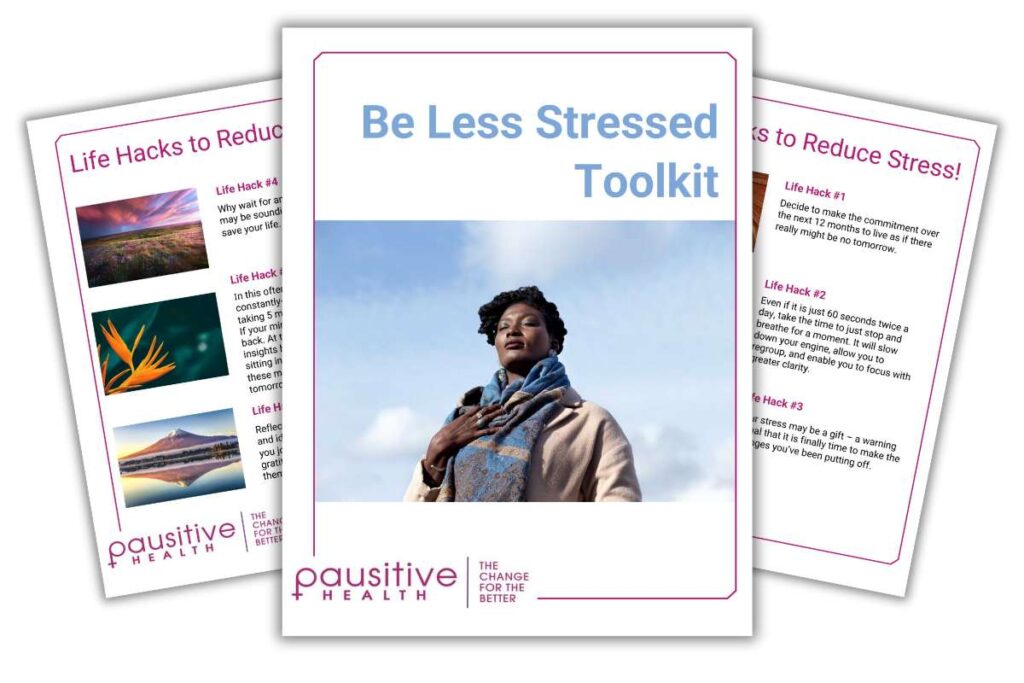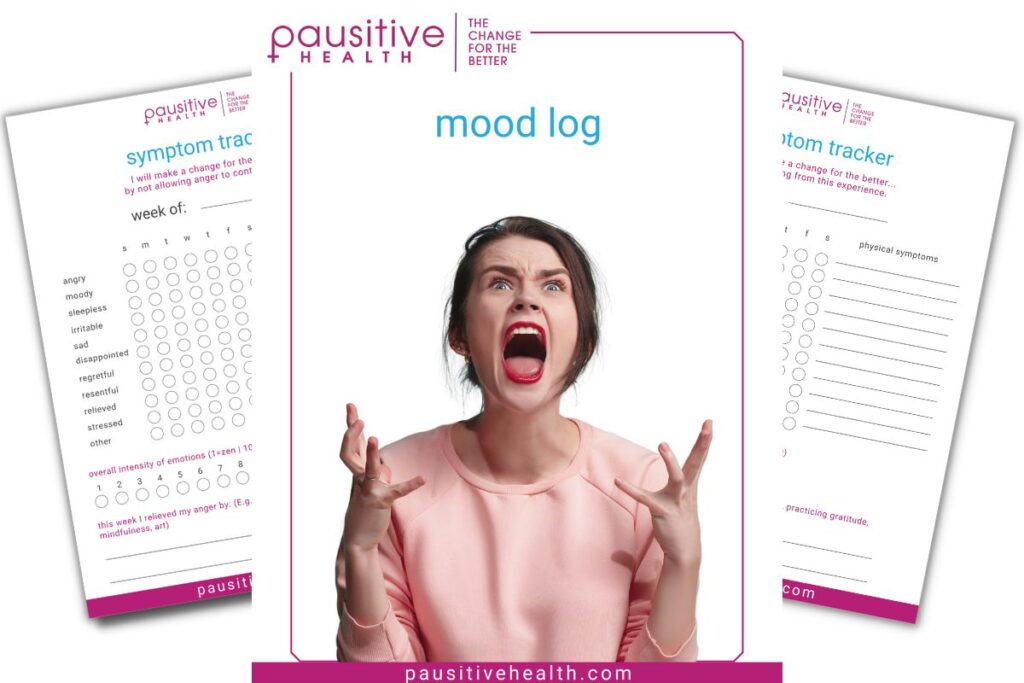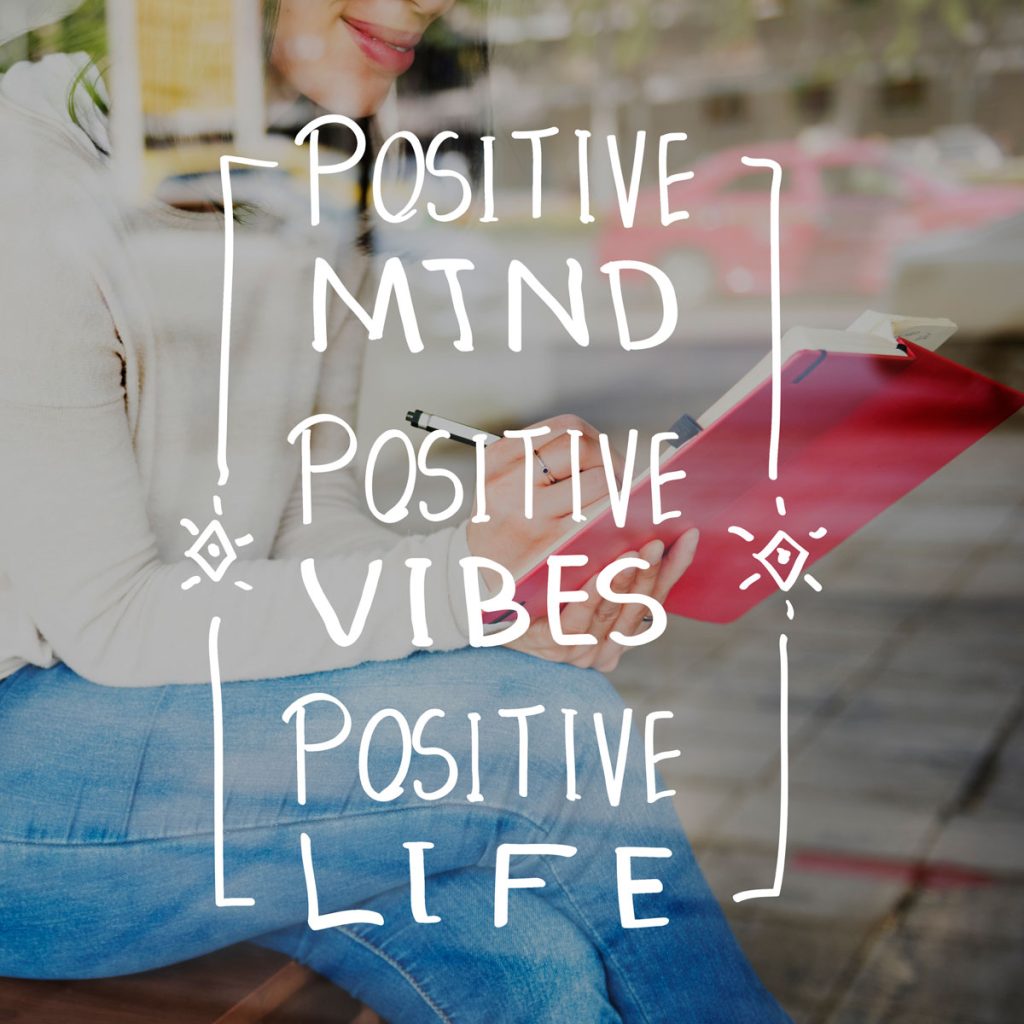Do you become angry at a moment’s notice? Women in their 40s, 50s, and beyond can feel irritable, rage, and anger as their hormones fluctuate during menopause. If there’s a fire burning inside you, know that it’s normal. While it may feel like you’ve lost control, there are surprising benefits to anger. Learn how to leverage anger during menopause and transform it into a positive force.
Anger during menopause
Anger gets a bad rap because it’s powerful and can be destructive to your health and relationships with others.
Even though life is not the way you believe it should be, it doesn’t mean it has to lead to negativity. What if we shift that to positivity?
First, let’s get off your chest all the reasons you’re angry during menopause:
Anger is a signal that something is not how we believe it should be.
- Symptoms are bothersome.
- Daily life and relationships are impacted by brain fog, hot flashes, mood swings, rage, and anger.
- You have other midlife stressors to worry about – empty nest, career stress, relationship woes, financial concerns, or caring for a parent.
- Your relationship with your partner or husband is stale, and menopause makes it worse.
- You feel old because society told you to feel that way.
- Your doctor doesn’t know how to help you.
- You only know about HT and not non-hormonal options to manage menopause symptoms.
- Your workplace doesn’t have menopause-friendly policies.
The list can go on and on. You probably have a lot more to add especially if you went into early or premature menopause.
Menopause may not be the experience of your dreams. It’s probably a long-awaited moment of dread due to societal norms that have made it taboo.
There is light at the end of this tunnel, though. There’s momentum, and women+ are finally getting the solutions they need for menopause.
Investments in women’s health are skyrocketing, and you’re going to benefit.
We still have a long way to go, but we’re making progress.
At pausitive health, our goal is to inspire you to make a change for the better.
What if your anger served as a motivator to make the changes needed to optimize your well-being? There would be a positive impact on your health, and your outlook on menopause would change.

Be Less Stressed
Feeling stressed or overwhelmed? Learn life hacks to reduce stress with the Be Less Stressed toolkit.
"*" indicates required fields

Benefits of anger: examples of positivity
When you think of the most basic definition of anger, it may make you wonder why it has such a negative connotation. Remember, it’s a signal that something is not how you think it should be.
Sometimes that anger is triggered by and focused on injustice. The victims of injustice may be ourselves, someone else, or a collective wrong inflicted on a particular group of people or, more globally (literally), on humankind.
Anger over injustice can be a catalyst for:
- many social and civil rights movements – people of color, women, the LGBTQ community
- leaving a job with a toxic work environment
- speaking up and speaking out about abuse – physical, mental/emotional,
- the Paris Accord on climate change
- Eroding the menopause taboo and sparking menopause-friendly workplaces, as is happening in the UK.
Anger fueled many of these societal shifts. It brimmed to the point people spoke up and demanded change.
The positive side of anger is the action it can trigger, the force for good it can become if channeled constructively, and the sense of purpose it can create or awaken.
In a TED Talk, Nobel Peace Prize Laureate Kailash Satyarthi encourages channeling anger into positive social outcomes. It’s a way to rid the world of evil and injustice. If we all look at our anger as positive fuel, we can improve the world.
For Satyarthi, how do we make peace? We get angry! We channel the energy that comes from anger into positive and peaceful solutions.
Think about it in terms of menopause. Anger fueled pausitive health’s creation. A friend’s doctors weren’t listening to her when she discussed her menopause symptoms. They also didn’t listen to her when she expressed a strong desire to try something other than hormone therapy.
She felt others were trying to control her body and were unwilling to find a solution that worked for her. This friend’s anger over that situation and our frustration sparked an idea – let’s help women make a change for the better with pausitive health.
Transformation rarely happens overnight, nor is it easy. Think about how long it’s taken for menopause to come out of the shadows. Women+ are finally talking about it, and the more it’s discussed publicly, the faster the taboo gets smashed.
It takes hard work, whether advocating for world peace or finding peace within your own family or soul.
No matter your goal, whether it’s global or focused in your own little corner of the world, there are actions you can take to begin the and help you convert anger into positive energy and meaningful action.
So, let’s frame your menopause anger so that it can be used for good and improve your health.
How to channel anger
Now that you’re ready to cope with anger and channel that energy into positive change, how do you do it? There are three steps to channeling anger.
- Accept your anger without passing judgment.
- Identify your anger triggers.
- Develop a tactic to channel your anger.
- Agree to disagree
- Breathing
- Speak in: Use compassion to find gratitude
- Speak out
- Let go of any remaining negative energy.
- Be open-minded about menopause.
- Take care of yourself.
Anger can flare in a flash, and there are sometimes deep-seated emotions that may surface as feelings of resentment or rage. You have to channel both types of anger.
Accept your anger
How would you describe how you feel? Angry, full of rage, ready to explode, or irritable?
Ready to accept your anger?
There’s nothing wrong with you for feeling this way. Anger is a natural emotion.
The man who is angered by nothing cares about nothing.
Edward Abbey
Don’t feel guilty for feeling the way you do. Get rid of the notion that anger is always a negative emotion. Think about the benefits of anger and how it can help you fuel positive change within yourself.
You are not alone in your thoughts.
Accept the anger without judgment while recognizing that saying things you later regret or storming out of a room may feel good in the heat of the moment but ultimately don’t solve the problem in the long term.
You may not recognize yourself at this stage of life, but that’s ok. You’re accepting your anger and ready to find the cause so you can treat it.
Finding the source of your anger
Second, identify your anger triggers.
There are many potential reasons to be angry during menopause.
Start by understanding the causes of your anger, the intensity of your emotions, and physical symptoms that may develop and let you know you’re about to flare, e.g., heart pounding, jaws clenched.
What drives you to get so angry? That may not be obvious at first. Writing down how you feel daily can help you find the source of your anger and situations that trigger those fiery emotions.

Get Relief From Your Emotions
Having mood swings? Track how you feel, identify your triggers, and find ways to calm the emotional firestorm with this mood log.
"*" indicates required fields
It is often someone or something you love, fear, uncertainty about your life, stress, disappointment, or regret.
Perhaps you’re mad at others for the way they are reacting to your menopause journey or the way you feel at work when a hot flash comes on because there’s no menopause policy in place that accommodates women at this stage in their life.
Maybe you’re angry over the loss of control. During menopause, rage can feel like being a puppet being jerked around and can lead to more frustration.
Maybe you’re angry that you have severe symptoms while your friends seem to be going through the journey unscathed.
And then, of course, there are the hormonal shifts and volatility as well as symptoms like sleeplessness due to night sweats and palpitations that often surface during the menopause transition.
Give yourself grace. Allow yourself to be angry, then find a way to release that anger so you can transform it into positive action.
After a few weeks, look for trends or patterns. Does fear, uncertainty, or love trigger it? These are some of the more common ones.
Develop coping mechanisms
Once you know your anger patterns and their physical signs, develop a tactic to stop it in its tracks.
Douse the fire and transform hostility, irritation, and outrage into something positive.
Deep breathing, agreeing to disagree, exercise, compassion for yourself and others, and gratitude are excellent anger management tools to transform your anger.
Let’s break down each coping skill.
Agree to disagree
When irreconcilable differences are at play, what good does it do to continue arguing? It often escalates the situation and intensifies the fire within you; nothing gets resolved in the end.
When you agree to disagree, the situation can often deescalate quickly. You can walk away or say out loud that you agree to disagree, and you’re walking away because you know there’s no way to convince the other person to see the situation differently.
Breathe through the emotions
You can also breathe through the situation. When you sense the fire burning within, stop. Take a breath and breathe slowly and deliberately. Let the tension ease in your shoulders and let the moment of frustration pass.
This is also a great technique during a hot flash. Think of anger like a hot flash. It’s a frustrating moment or two, but it will pass!
You can take your breathing exercises further with mindfulness.
Practice for a few minutes each day, and it will become natural over time. You’ll be able to tap into this powerful technique when a moment of anger arises.
You often act on impulse with anger, but if you focus on your breath, you’ll find yourself going through your day with less irritation.

Speak in: use a gratitude journal
It’s important to take responsibility for anything you may have done or not done to contribute to your anger. But first, stop and show some kindness to yourself rather than moving immediately to blame yourself, or others, for feeling anger,
Find a way to increase your self-awareness of some of the stories you tell yourself and to express your feelings in a safe environment, e.g., gratitude journaling.
Reflect on the positive things in your life and write them down.
It is difficult at any given moment to be both grateful and angry at the same time, but it’s not impossible. Living a grateful life can calm your nervous system, reduce stress, improves sleep, and you become less bothered by things that used to drive you mad.
Studies of the neuroscience of gratitude have shown that practicing gratitude causes your brain to release dopamine and serotonin, which improves mood and makes us feel good.
Spending five minutes at the end of every evening focusing on something you’re grateful for changes your outlook. Over time, you benefit from the positive impact of gratitude on both your physical and mental health and well-being.
When you practice gratitude, you’re taking compassion one step further. It’s challenging to be grateful and angry simultaneously, but it’s not impossible!
Use compassion to find gratitude
When you start down this gratitude path, understand everyone deals with anger to various degrees. It’s a very human emotion.
It impacts all of us, even psychologists who help others manage it.
Licensed clinical psychologist, Russel Kolts, reflects on his anger in a powerful TEDx Olympia Talk, Anger, Compassion, and What It Means To Be Strong. He talks about when he realized it was time to transform his anger so he was no longer irritable.
His wake-up call came when his son was just three months old. He had a lot of work to do, and his son wouldn’t go down for his morning nap.
Like many parents who have tip-toed their sleeping child to the crib, Kolts said his son woke up the minute he sat down to work. Guess what? He got angry!
Then he took a moment to realize how silly it was that he was upset his 3-month-old son did what newborns do – cry!
You’ll have these ah-ha moments when you reflect with compassion. Think back to a recent time when you struggled with anger. Now, look at that situation using a lens of compassion.
Compassion can help you deal with anger. You can be a better person and manage the situation differently by showing kindness.
As Kolts points out, we don’t necessarily choose our temperament. So, if you have a temper or get mad quickly, accept yourself for who you are. Say yes to the life you have!
This anger management technique can be used in the most extreme circum-stances. Kolts uses it successfully with violent criminals, and it works. How will you make it work for your life?
Why is it hard to feel grateful?
If you have a hot personality, it may be easier to feel anger and outrage over a situation rather than be grateful for it. Think about it. Is it easier to list the things that went wrong with your day rather than go right?
FastCompany explored why it’s so easy to feel outraged rather than thankful.
Villanova University assistant psychology professor believes the human negativity bias is to blame. It goes back to the days when we were hunters and gatherers. And it helps drive the “fight or flight” reflex that shows up when we are stressed.
While times have changed, our brain still works that way. It’s always process-sing information and alerting us to dangerous conditions. Our brain has to process more information now than when those hunters and gatherers had to scan the horizon for danger.
It’s not just that our brains are programmed to think this way; negativity surrounds us on the news, through our interactions with other people, and in the workplace.
Our world is filled with anger like never before, so it’s understandable if your life is by it too. It’s almost inescapable. It’s beneficial to rise above the anger and practice gratitude.
In return, you’re inclined to feel happier and have more reserves for all your challenges.
Benefits of gratitude
FastCompany points out the benefits of practicing gratitude in the workplace. Employees are more productive and work together better as a team. Think about it – if your coworkers are grateful for your contributions, you’re more willing to help them and go above and beyond and reciprocate your gratitude.
Studies back up this theory and show positive impacts in the workplace!
There are benefits to gratitude in your own life too. Find out how gratitude heals.
You’ll not only feel better, but you’ll also lead a healthier life.
When you transform your anger, your health follows. Studies back this up. A life filled with gratitude, rather than anger, leads to improved heart health, according to research at Massachusetts General Hospital.
And the American Psychological Association has found patients who used a gratitude journal for eight weeks showed lower levels of several inflammatory biomarkers. The list of positive health impacts goes on and on, from lower rates of post-traumatic stress disorder in veterans to lower rates of depression.
Speak out
If you’re not the journaling type, speak out. Turn your energy into something positive by helping your community. Volunteer with an organization or (definitely!) vote. You’ll feel better and get satisfaction from concretely seeing the impact of your efforts and exercising your power, which is much more than is often recognized.
You can also literally say something or set an example.
Speak out by voicing your anger and concerns. It may lead to a snowball effect like the “Me Too” movement and help society to retain its humanity in world that can sometimes make it easier to see anyone who speaks/looks/acts differently than that to which you are accustomed. Say something if you don’t think your employer is doing enough to help with menopause in the workplace. You can’t begin to fix a problem or address a need if leaders don’t know about it. In the UK, that type of action has led to legislation around support for those going through menopause as well as a system through which employers can achieve a “menopause-friendly workplace” designation!

Let go of negative energy
By practicing gratitude and speaking out, you’ll naturally let go of some of that may be a negative in your life. You should begin feeling better at this stage, but some anger may still be brewing below the surface.
As they say in that Frozen song, “Let It Go!” Release the anger.
If you let the anger build up inside, you won’t be able to move on and heal.
Resentment will build and will chip away at relationships and forward progress.
Find a cathartic way to release your emotions. Just like the coping mechanisms above that help you overcome the intense anger in the heat of the moment, you can also use these techniques as long-term strategies to improve how you feel.
You can add exercise to your daily routine so long-term you can process and physical help to manage those emotions. And when you run or take a walk, it’s common to gain greater perspective, generate ideas, and process your innermost thoughts.
You can also find a way to express your inner feelings through art or music.
And getting together with friends or family can make a difference. Talk through the situations. Be honest with yourself and others. Remember, you’re accepting your anger without judgment.
Finally, having a pet can soothe frayed nerves. Besides the unconditional love you may receive, you may also notice how quickly animals accelerate during moments of agitation and put them in the past without rumination.
Let go of any anger that’s deep within because it’s holding you back.
Be open minded about menopause
You’ve made the pivot from anger to power and have learned how it can be leveraged to be a positive emotion.
Now, let’s change your mindset on menopause.
You don’t have to sit back and let menopause wreak havoc on your life. You can help control your symptoms with mindset and lifestyle adjustments.
A cross-sectional study of 243 midlife women with vasomotor symptoms (commonly hot flashes and night sweats) found that perceived control was the strongest negative predictor of vasomotor symptoms.
So, women with high levels of perceived control reported lower symptom severity than women with low perceived control.
In some cultures, the menopause journey is even viewed as a path to freedom, more choices, and greater societal stature!
Studies have shown that if your perception is you don’t have control over your symptoms, you may feel more severe hot flashes and night sweats.

Take care of yourself
Let’s go back to the definition of anger. It’s fueled by a reaction to something that is not how you think it should be.
So, in the case of menopause, make a change for the better by taking care of yourself. Did you know you can manage many menopause symptoms by changing your lifestyle?
Menopause is commonly associated with what’s happening in your ovaries, but it’s a mental, physical, and spiritual experience.
Find time to care for yourself – mind, body, and spirit.
Try exercise, eat foods rich in the vitamins and nutrients a menopausal body needs, limit alcohol, and find ways to get enough sleep.
These fundamental lifestyle tools can help you feel better during menopause.
They’re the most basic form of taking care of yourself! Your body will thank you, both now and in the future!
How to make peace? Get angry | Kailash Satyarthi [TED Talk 2015]
How To Practice Mindfulness Every Day | PeopleTweaker
How To Use A Gratitude Journal To Boost Your Happiness | PeopleTweaker
Discovering the Health and Wellness Benefits of Gratitude | Wharton Healthcare Quarterly
Anger, Compassion, and What It Means To Be Strong | Russell Kolts TEDxOlmpia [YouTube]
Why Is Gratitude So Difficult, Yet Outrage So Easy? | FastCompany
Discovering the Health and Wellness Benefits of Gratitude | Wharton Healthcare Quarterly
Gratitude – The Power to Heal the World – Within Your Reach | Linda Roszak Burton TEDxGreatMills [YouTube]
Cardiac Psychiatry Research Program | Massachusetts General Hospital
Mills P, Redwine L, Wilson K, Pung M, Chinh K, Greenberg B, Lunde O, Maisel A, Raisinghani A, Wood A, Chopra D. The Role of Gratitude in Spiritual Well-Being in Asymptomatic Heart Failure Patients. Spirituality in Clinical Practice. 2015. Vol 2, No. 1, 5-17. http://dx.doi.org/10.1037/scp0000050
Let It Go | Idina Menzel – from Frozen
Pimenta F, Leal I, Maroco J, Ramos C. Perceived control, lifestyle, health, socio-demographic factors and menopause: Impact on hot flashes and night sweats. Maturitas. Volume 69, Issue 4, 2011, Pages 338-342.
ISSN 0378-5122. https://doi.org/10.1016/j.maturitas.2011.05.005.
You may also like…

Menopause Rage Is Real! How To Tame The Beast Inside
Do you feel menopause rage? Learn how to tame the beast inside and control your emotional symptoms, including anger, during menopause.

What Causes Anger Issues During Menopause And How To Manage It
Do you feel anger during menopause? It can make other menopause symptoms worse. Learn what causes anger issues and how to manage them.

The Top 6 Ways To Manage Your Anger And Feel Love Again
How do you manage your anger and feel love again, when you’re hormonal due to menopause? Try these techniques to rekindle your relationship.

